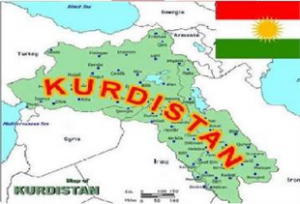
Time for an Independent Kurdistan

American Newspaper ,An independent Kurdistan is now more feasible than ever.Today, Iraqi Kurds have an autonomous Kurdistan Regional Government (KRG), a military with a civilian commander-in-chief, and modern state institutions. Kurdistan has attracted billions in foreign investment, and is the only place in Iraq where Westerners truly feel safe.
Recent events inside Iraq and Syria have made the moral and strategic case for an independent Kurdistan stronger than ever. Likewise, circumstances have shifted such that Turkish acceptance of a peaceful Kurdish state is increasingly evident. The United States would be wise to seize this historic opportunity and lend its diplomatic weight to the Kurdish cause.
The United States was unable to secure a Status of Forces Agreement permitting U.S. troops to remain in Iraq after 2011, but in a quid pro quo for independence, an Iraqi-based Kurdistan would certainly welcome U.S. troops. These troops would provide a hedge against Iranian overreach, aggression from Baghdad, a resurgent al Qaeda, spillover from the Syrian civil war into Kurdistan, and any other regional threat that may arise. More recently, Iraq’s mixed record on preventing Syria-bound weapon transshipments from Tehran has forced Washington to ask an important question: what kind of ally has Iraq become, and if current experience is indicative of the future, should Washington look for more reliable allies in the region? Perhaps Iraq’s territorial integrity, which thus far the United States has advocated fiercely to preserve, is not so sacrosanct.
Not only is there a strategic imperative behind Kurdish independence, but there are moral arguments to be made too. From cultural repression to a chemical weapons campaign in the 1980s, Iraqi Kurds have long suffered as unwanted outcasts at the hands of the Baghdad elite. When the United States established a protective no-fly zone in 1991, Kurds elected a national assembly, which has since paved the way for one of the few democracies in the Muslim Middle East. The Kurds remained among America’s greatest supporters during the overthrow of Saddam and the ensuing occupation and reconstruction.
Today, Iraqi Kurds have an autonomous Kurdistan Regional Government (KRG), a military with a civilian commander-in-chief, and modern state institutions. Kurdistan has attracted billions in foreign investment, and is the only place in Iraq where Westerners truly feel safe.
Critics argue that creating a Kurdish state would destabilize Iraq. Not to be cynical, but Iraq is already unstable. Most of the instability is from al Qaeda elements and Arab Sunni and Shiite extremists engaged in sectarian strife. Critics also point to the disputed status of the oil-rich Kirkuk region as a thorn that would complicate Erbil’s breakaway from Baghdad. However, the two sides are capable of settling this peacefully. A referendum on Kirkuk’s status, mandated by Article 140 of the Iraqi Constitution, was scheduled for 2007, postponed to 2009, and then postponed again indefinitely. The referendum’s prerequisites include population “normalization,” i.e. the repatriation of those who were expelled from their land by Saddam, as well as a census. Out of fears of land grabs by the repatriated and an unfavorable result of the census (to either side), enough politicians in Baghdad and Erbil have been motivated to delay the referendum. Fulfillment of the referendum is an obvious prerequisite for Kurdish independence. If Baghdad does not cooperate, the Kurds could lay out an ultimatum. Georgetown University’s Center for Kirkuk Referendum Operations has tracked this issue through the years, and if and when the referendum is rescheduled, will lead an international monitoring effort.
The case for including Syrian Kurdistan in a new Kurdish state is somewhat less compelling. On one hand, the Syrian civil war has allowed Kurds, occupying the far northeast of the country, to carve out a relatively autonomous and stable region, free of government and rebel control. This shows a promising ability to self-govern. Joining this area to Iraqi Kurdistan would also remove one additional ethnic group vying for retribution in the chaos that will ensue when Syrian President Bashar al Assad falls. However, as the Atlantic’s Jonathan Spyer recently reported, Kurds in Syria and Iraq have a complex relationship and make uneasy bedfellows. Syrian Kurds accuse Turkey of supporting jihadist rebels’ efforts to destabilize the Syrian Kurdish region. In contrast, the Kurdistan Regional Government is a Western- and business-friendly government on good terms with Turkey. The best outcomes include Syrian Kurdish parties gaining representation in Erbil’s National Assembly, or Syrian Kurdistan’s admission as an autonomous entity in a broader federation.
Independence would correct the 1922 oversight. Now that circumstances have appropriately evolved. This is a rare diplomatic moment when action is not only strategically advantageous, but the right thing to do.
PNA
Jay Hallen, CFA is a New York-based writer and financial consultant.
- 5375 reads


